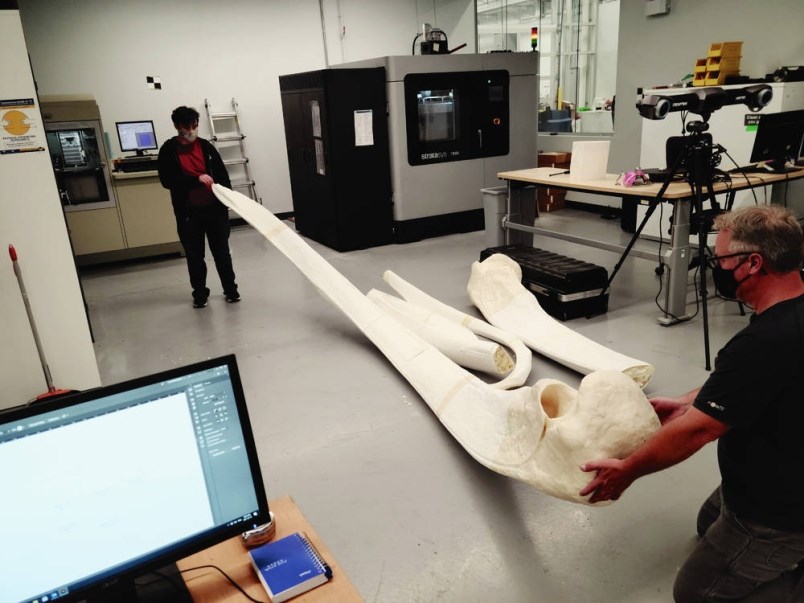Museums and university collections around the world are turning to a B.C. public-and-private partnership when they’re trying to find missing parts of skeletons of large animals, such as dinosaurs or whales, to study or display.
Camosun College’s Camosun Innovates and Technology Access Centre has been working with Cetacea Contracting to scan and manufacture replicas of missing bone fragments of large animals — some up to 4.3 metres in length — using a 3D printer at the college.
“Compared to conventional means for replicating whale bones that would involve pulling real bones from an identical-sized whale and casting new ones, or alternatively hand sculpting them, we’re able to 3D scan donor bones, rescale them to the appropriate size, and then produce replicas in a fairly short period of time,” said Matt Zeleny, applied research specialist at Camosun Innovates.
“With the technology that is available these days and the expertise that Camosun has, it makes the 3D scanning, printing and replication process feasible and affordable for our partners.”
Salt Spring Island’s Cetacea Contracting is an expert in the articulation and display of mammal skeletons. They have collaborated with Camosun to devise a faster and less expensive replication method.
“Camosun Innovates has both the knowledge and the cutting-edge technology to advance our work,” said Mike de Roos, president of Cetacea Contracting.
“They’ve been ideal partners in helping us work with clients around the world to design exhibits and replicate parts of skeletons that are of the highest quality and precision in a cost-effective and timely manner. Our capacity as a small business has substantially increased since partnering with Camosun Innovates and we couldn’t be more pleased to have such an excellent, and local, partner right here in British Columbia.”
Past projects include work on an anatomically correct articulation and armature design of a historic blue whale skeleton for the Western Australia Museum in Perth and the design of a humpback whale skeleton exhibit for the Quandamooka Yoolooburrabee Aboriginal Corporation in Queensland, Australia.
Their latest project is to recreate missing parts of a bowhead whale for academic study and human appreciation. When complete, the life-size, scientifically accurate specimen will be suspended in an enclosure at the University of Alaska’s Museum of the North.
Camosun College, established in 1971, is one of the largest colleges in the province, delivering academic and applied programs to 20,000 students annually.


